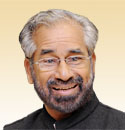Fifty Years of Leadership for Global Peace and Human Survival
Dr. N. Radhakrishnan
Chairman of the Indian Council of Gandhian Studies, India
To countless peace-loving citizens all over the world the year 2010 marks quite a few important milestones among which signify the courageous and resolute step of determined peace promoters and humanists under the leadership of Dr. Daisaku Ikeda, striving towards innovative and creative programmes aimed at promoting world peace and the development of a new citizenry. To any impartial observer of international development, this unmistakably offers several valuable lessons, particularly in leadership.
Humanity has several lessons to learn from the leadership of the prime mover of this development--Dr. Daisaku Ikeda. Hailed and admired the world over as "Sensei" respectfully, this savant of humanity has opened new vistas of individual and collective initiatives for universal peace.
The transformation of a small band of lay believers of Nichiren Buddhism in Japan into a mighty and powerful international movement for education, peace and spiritual awakening has very few parallels in human history.
Incidentally, 2010 also marks the 25th year of my first meeting with Dr. Ikeda. During these 25 years my association with Dr. Ikeda and his movement has been quite close. As a researcher I could understand and analyze the vitality of the movement and its significant contribution to world peace and human survival. While I respect him and admire him profoundly, my approach to his leadership and contribution has been critical and I did not want it to be that of a hero-worshipper.
From a Gandhian perspective, I can readily see the relevance of the various innovative steps of Dr. Ikeda to bestow the Soka Gakkai movement with a cutting edge and global acceptance.
Among his contributions over the last 50 years has been to inspire youth in their ability to usher in meaningful social and individual changes. He has similarly empowered women and recognized the role of education to effect societal change.
Dr. Ikeda developed his model for the Soka Gakkai as a vehicle of human transformation and an instrument to battle iniquity by remaining loyal to his religious ideals and to his devotion to his mentors in life, Josei Toda and Tsunesaburo Makiguchi. Yet, in doing so, he dismantled the traditional barrier between mentor and disciple, becoming a personal friend and guide, someone to whom one could turn for help.
He realized that any movement, if it is to survive and be embraced by ordinary people, has to be progressive and must avoid becoming mired in the morass of dogma. He revolutionized the religious sphere of activities and reshaped it as a collective activity for common good as Gandhi had hoped politics would become. Dr. Ikeda, in short, had brought about a silent revolution at the individual level.
To ensure the right of humanity to prosper and enable people to discover their full potential, dialogue is a prerequisite. Over the years, Dr. Ikeda has emerged as the focal point of a global effort to advance dialogue among civilizations, to promote disarmament, sustainable development, environmental protection, educational reforms, human rights protection, gender equity and better understanding among religious traditions. He has held over 1,500 dialogues during the last four decades with remarkable felicity and élan, raising the practice of dialogue to a level not seen since Socrates and Plato. In him, I see a living Gandhi.
The Indian Council of Gandhian Studies recently developed a new initiative to highlight the importance of dialogue, reconciliation and justice as national objectives and to employ them for effective conflict resolution. On August 6, 2009--the day of the atomic bombing of Hiroshima--the initiative was launched in New Delhi as the Citizens' Commission for Dialogue, Justice and Reconciliation, which was certainly due to Dr. Ikeda's influence on me and many of us in India.
Fifty years of Dr. Ikeda illustrates that nothing is impossible, provided we are determined and refuse to submit to defeat.
N. Radhakrishnan, Chairman of the Indian Council of Gandhian Studies in India, is a renowned Indian social activist and former director of the Gandhi Smriti and Darshan Samiti (Gandhi Memorial Hall) in New Delhi. His dialogue with Daisaku Ikeda was published in Japanese and traditional Chinese. The tentative English title is "Toward a Humane Century: Gandhi and Indian Philosophy."
[Taken from a message published in the May 4, 2010, issue of the Seikyo Shimbun, Soka Gakkai, Japan]
Share this page













